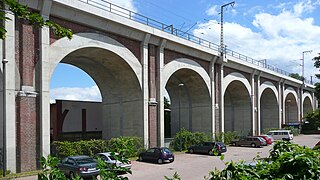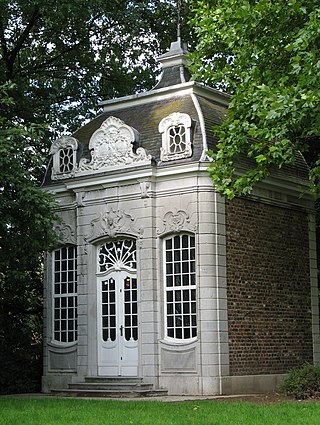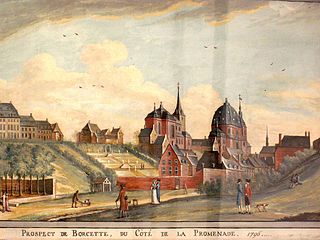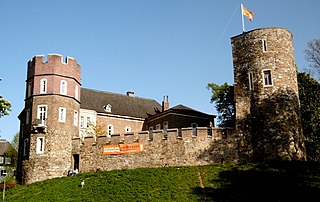Self-guided Sightseeing Tour #10 in Aachen, Germany
Legend
Tour Facts
7.4 km
103 m
Experience Aachen in Germany in a whole new way with our free self-guided sightseeing tour. This site not only offers you practical information and insider tips, but also a rich variety of activities and sights you shouldn't miss. Whether you love art and culture, want to explore historical sites or simply want to experience the vibrant atmosphere of a lively city - you'll find everything you need for your personal adventure here.
Individual Sights in AachenSight 1: Marschiertor
The Marschiertor, until the 17th century also called Mies(ch)ierspforte or later also Berseter Tor or Burtscheider Tor, was the south gate of the outer Aachen city wall. It is one of the mightiest surviving city gates in Western Europe. Its construction began around 1257 and was probably completed shortly after 1300. With the Marschidetermined Gate, also known as the Burtscheid Middle Gate, it had a counterpart in the inner ring of walls, the so-called Barbarossa Wall, which had a total of ten gates.
Sight 2: Verwaltungsgebäude Bahnhofplatz
Haus Grenzwacht is a listed high-rise building in Aachen, Germany, which serves as an administrative building for the Aachen city administration. It was created from the shell of the Lochnerhaus, which the entrepreneur Rudolf Lochner originally wanted to build on this site and which was considered Germany's best-known investment ruin at the time. On the roof of the building is the Aachen weather column, visible from afar.
Sight 3: Haus Matthéy
Das Haus Matthéy ist ein unter Denkmalschutz stehendes Gebäude in der Theaterstraße in Aachen mit der Hausnummer 67. Das ursprüngliche Gebäude wurde 1834 von Adam Franz Friedrich Leydel im Auftrag des Tuchfabrikanten Heinrich Anton Deusner (1787–1870), eines Sohnes des aus dem Raum Frankfurt am Main stammenden und in Aachen tätigen Tuchfabrikanten und Politikers Christian Friedrich Deusner (1756–1844), als repräsentative Stadtvilla im klassizistischen Stil erbaut. Von dieser existiert lediglich die heute original eingearbeitete Fassade. Das Haus trägt seinen Namen nach dem letzten Privatbesitzer, dem Textilkaufmann und Kunstsammler Teo Matthéy (1901–1989). Das viele Jahre weitgehend leerstehende Gebäude wurde im Juni 2019 durch Erbbaurecht von dem Ehepaar Volker und Andera Gadeib übernommen. Von 2019 bis Juni 2022 wurde das Stadtpalais aufwändig denkmalgerecht saniert und zum Sitz der Firma Dialego AG umgebaut.
Sight 4: Dreifaltigkeitskirche
The Holy Trinity Church is the largest Protestant church in Aachen. It was built between 1897 and 1899 on the historic city border between Burtscheid, which was independent until 1897, and the city of Aachen and is a listed building. In 2006, it was abandoned as a parish church in the course of the redivision of the parish districts and since 2015 has served as a youth church of the Evangelical Church of Aachen, which belongs to the Aachen church district of the Evangelical Church in the Rhineland.
Sight 5: Ehemaliges Redemptoristenkloster St. Alfons
The monastery of the Redemptorists in Aachen is a former monastery complex of the Redemptorist order. The convent building was built in 1862 according to plans by Heinrich Wiethase in the neo-Romanesque style, and the associated monastery church was completed in 1865 and dedicated to the founder of the Redemptorist order, Alfonso Maria de Liguori. After the withdrawal of the order, the monastery was owned by the Diocese of Aachen from 1986 to 2005, which had made it available to the Jesuit community of Aachen. It was then sold and, after its profanation, converted into an office complex. In order to preserve the historical inventory, the church and monastery were placed under monument protection.
Sight 6: Burtscheider Viadukt
The Burtscheid Viaduct was built between 1838 and 1840 as the first large German railway viaduct by the Rhenish Railway Company and is one of the oldest railway bridges still in use in Germany. It is located in front of Aachen Central Station on the Cologne–Aachen railway.
Sight 7: Gartenhaus Nuellens
The Nuellens Garden House, also known as the Nuellens Pavilion, is a Baroque garden pavilion built in 1740 by the Aachen master builder Johann Joseph Couven. Today it is located on the edge of the Burtscheid spa gardens and is a listed building.
Sight 8: Kurpark Burtscheid
The Kurpark Burtscheid is a green space in the Aachen district of Burtscheid that was laid out at the end of the 18th century. The Burtscheid Kurpark is the oldest park in Aachen and has been changed several times in its size and use over time. Until the middle of the 20th century, more than 15 artesian thermal springs still sprang up within the spa park. There are several listed buildings on the park grounds, such as the translocated Nuellens Pavilion, the Fürstenbad and the former Neubad.
Sight 9: Burg Frankenberg
The Frankenberg Castle is a castle in the Frankenberg area of Aachen-Mitte, itself a district of Aachen, Germany. Its name comes from the concept of a "Franke", which was a type of castle that did not owe fealty to any others. Of course, shortly after its construction, the lowland castle became a fief of a Graf, and later belonged to the Duchy of Jülich-Cleves-Berg.
Sight 10: Intzeturm
The Tuchfabrik Aachen AG was one of the larger textile companies in Aachen. It was founded in 1859 by the entrepreneurs Alfred Ritz and Conrad Vogel in Aachen, initially under the name "Ritz & Vogel", and in 1873 it was transferred to a newly built factory on Charlottenstraße on the banks of the Beverbach in the Frankenberg district, which at that time still belonged to the neighbouring town of Burtscheid, according to plans by Otto Intze. In 1887, the complex was taken over by the manufacturers Siegmund Sternau and Albert Süskind, who contributed their cloth factory "Süskind & Sternau", founded in the 1870s, and transformed the new entire company into "Tuchfabrik Aachen AG" in 1897.
Sight 11: Kongressgarage
The Kongressgarage is a domed building built in 1924 at Kongressstraße No. 23 in Aachen.
Sight 12: Ostfriedhof
The Aachen East Cemetery is the oldest cemetery in the modern history of the city of Aachen, which was built in 1803 at the instigation of the French municipal government. It is located in the east of the city area and geographically belongs to the northern quarter. The East Cemetery was placed under monument protection on 6 December 1988 as one of the oldest examples of modern cemeteries.
Sight 13: Grabeskirche St. Josef
St. Josef in Aachen is a former Catholic parish church, which is now used as a columbarium for urn burials under the name "Church of the Holy Sepulchre", also because the neighboring Aachen East Cemetery has reached the limits of its capacity.
Sight 14: Pfarrkirche St. Fronleichnam
The Aachen Church of St. Corpus Christi is the parish church of the Catholic parish of St. Josef and St. Corpus Christi and the most famous and at the same time best documented church building by Rudolf Schwarz. The sacred building, built in 1929/30, was originally the parish church of the parish of St. Corpus Christi, which was merged with the parish of St. Josef in 2005. The former parish church of St. Josef has been used as a columbarium for urn burials since November 2006 under the name Church of the Holy Sepulchre.
Sight 15: Kennedypark
The Kennedypark is a 52,000 m² green area in the Ostviertel in Aachen. He was created on a former military site in the 1960s and named after the murdered US President John F. Kennedy.
Share
How likely are you to recommend us?
Disclaimer Please be aware of your surroundings and do not enter private property. We are not liable for any damages that occur during the tours.
GPX-Download For navigation apps and GPS devices you can download the tour as a GPX file.













